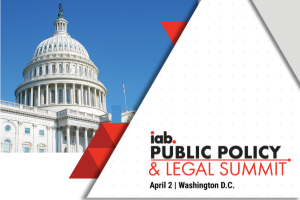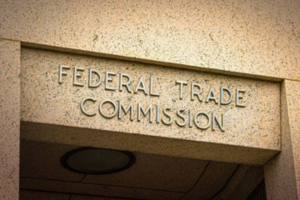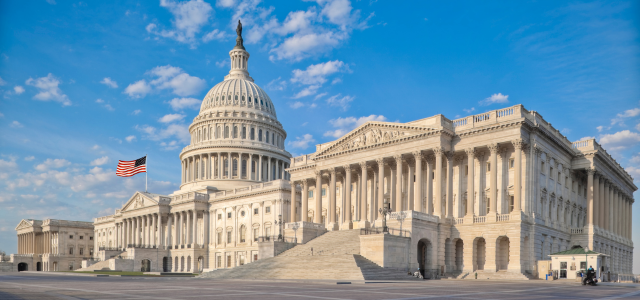
IAB Public Policy Blooms In D.C

The 2024 IAB Public Policy and Legal Summit is taking place on Tuesday, April 2nd, in Washington, D.C. Have you booked your spot yet? Act quickly. This event was a sold-out success last year, featuring experts and insiders from leading brands, publishers, agencies, ad platforms, law firms and federal agencies, exploring the latest legislative, regulatory, and legal developments affecting our industry.
Whether you’re a privacy counsel or government affairs executive, brand strategist, marketer or ad tech guru, IAB Public Policy and Legal Summit offers valuable insight to guide you through the thorniest questions surrounding AI, data privacy, measurement and attribution, protecting children online, and more. Join your peers for a day of learning and networking just steps from the White House, when cherry blossom season in our nation’s capital will be in full effect.
Not only does IAB provide educational and advocacy opportunities for our members, but our leading trade association also provides policymakers overseeing digital advertising issues in Congress with information to better protect consumers and our vital industry. After hosting a six-part educational series for congressional staff last year, in February IAB hosted a trip to New York City for our first-ever graduating class, where they learned about the “life of a digital ad” from IAB members Google, Nielsen, and NBCUniversal.
IAB’s Public Policy Team is constantly conducting outreach to Congress and state houses across the U.S. to help policymakers understand digital advertising’s contributions to innovation, jobs, and the economy. Internet for Growth, a nationwide coalition of small businesses and creators, is helping legislators and regulators understand the important role digital advertising plays on Main Street and to prevent bills banning personalized advertising from harming opportunities for every American.
We need more IAB members to get involved. To inquire about joining or sponsoring initiatives like IAB Public Policy and Legal Summit, our Congressional Education Series, or Internet for Growth, please email Lartease Tiffith, Executive Vice President for Public Policy, at [email protected],
Related Coverage:
Consumer Study: Personal Data and the Value of the Free and Open Internet (IAB)
Data-Driven Digital Advertising is Crucial to Entrepreneurs and Under Threat (Entrepreneur)
CFPB Joins FTC In Attacking Digital Advertising

Digital advertising creates jobs and economic growth, not only at IAB member companies. Our industry is critical to virtually every other, including small businesses and creators, who rely on relevant, data-driven online advertising and marketing to reach bigger audiences, or even niche, small ones. Digital advertising is also a form of free speech.
Targeted communications on a variety of platforms help individuals and organizations share their viewpoints, gather support, and foster community. But at agencies like the FTC, the portrayal of digital advertising is almost entirely negative. Recent rulemakings paint digital advertising, and the internet itself, as inherently unfair and deceptive.
Under Chair Lina Khan, one of the earliest signs the FTC would be breaking with precedent, pursuing vast new powers, was its proposal to regulate “commercial surveillance,” a grim term that would criminalize most online activity. IAB pushed back forcefully.
“Commercial surveillance” rules appear to be on hold, but the agency is pursuing other lines of attack. Proposed rules for auto-renewals, integral to the online subscriptions, could dissuade people from subscribing in the first place, burdening customers with unnecessary information, while preventing businesses from offering useful information, such as better deals.
The idea is that people are easily fooled by “dark patterns,” another buzzword, like “commercial surveillance,” for standard marketing and advertising practices the FTC itself employs. In a recent amicus brief to a federal circuit, IAB pointed out the dangerous hypocrisy. The agency is seeking nearly unlimited authority to punish truthful commercial speech, everything from marketing language that’s too convincing to text size and color.
Fortunately, IAB is winning battles on behalf of digital advertising and our members’ constitutional rights. A judge insisted our amicus brief be included in the “dark patterns” case against Amazon with potential consequences for every advertiser. Despite FTC objections, an administrative judge recently ordered more hearings to investigate the agency’s subscription rules, more costly than the agency estimates.
Other FTC actions threaten free speech, too. Proposed rules for consumer testimonials and reviews would prohibit employees from speaking and hold companies liable for unsolicited comments. Purchasing fake reviews is wrong, but banning incentives for real customers to share their thoughts is also wrong. IAB has warned the agency against new rules that would punish truthful statements and companies operating in good faith to moderate user comments.
Other federal agencies are getting in on the act. Digital advertising helps Americans understand and access banking and budget apps, tax assistance, and other financial tools, but the Consumer Financial Protection Bureau (CFPB) has announced a proposal to ban financial institutions from using customer data to advertise their products and services.
Far from being unfair, deceptive, unreasonable, or unnecessary, digital advertising levels the playing for small businesses, increases competition, spreads useful information, and supports our economy, including Americans’ financial independence. IAB supports punishing bad actors who abuse the public’s trust and confidence, while we’re also promoting the benefits of digital advertising to the FTC and other federal agencies with the wrong idea about our industry.
Related Coverage:
IAB’s Tiffith Warns Against Overregulation in Digital Advertising (Beet TV)
The FTC’s Proposed Rule Banning Fake Consumer Reviews and Testimonials: An Update (JD Supra)
Media Trades Blast Proposed ‘Click To Cancel’ Rules (MediaPost)
Lina Khan’s Rough Year at the FTC (New York Magazine)
What President Biden’s AI Order Gets Right and Wrong

In The Drum, IAB EVP for Public Policy Lartease Tiffith reviews the President’s Executive Order on Safe, Secure, and Trustworthy Artificial Intelligence, mostly praising the order while warning against an over-reaction to AI, holding more promise than peril.
“When new technologies arrive, they are almost always accompanied by apocalyptic predictions,” writes Tiffith, citing the New York World at the dawn of electricity. According to the now-defunct newspaper, “Everything that will hold electricity is becoming more or less charged.. the earth, especially in the case of large cities, and the houses are being more or less saturated with it. It is time to call a halt before this thing goes any farther.”
“Those dystopian narratives are back now,” writes Tiffith, “this time about artificial intelligence AI.” For years AI has been helping advertisers improve data privacy, boost ad personalization, and drive cost-efficiencies and revenue, but the rise of generative AI, which can create text, images, video, code, and other output, has captured the public’s attention and prompted presidential action.
According to Tiffith, the White House has correctly focused on preventing deception and bias. He praises stronger protections for content creators and publishers. “The most important thing this Executive Order got right is that it didn’t allow a focus on challenges and dystopian thinking to lead its decision-making. There is enormous opportunity ahead, and we need to steer toward it and not away from it,” he writes. Read the entire article here.
Protecting Kids Online

In his most recent State of the Union address, President Biden again mentioned digital advertising. In each of his annual speeches to Congress, his particular focus has been protecting children online, and last week he called for bipartisan legislation, such as an update to Children’s Online Privacy Protection Act (COPPA 2.0) or Kids Online Safety Act (KOSA), to address the issue. The latter bill recently gained enough support to pass the Senate. Sen. Marsha Blackburn (R-TN), its lead sponsor, headlined ALM this year.
IAB was proud to have Sen. Blackburn at our premier event in January. We agree the internet should be a safe place for children to learn, play and communicate. However, we also believe KOSA could be a better bill, preempting conflicting state laws and avoiding overlapping enforcement among government agencies. Our members are also concerned about a “constructive knowledge standard” that could erect barriers to access to safe content for people of all ages, not just kids. In fact, bills like KOSA could require companies to collect more information than necessary to verify every user.
COPPA 2.0 is another bipartisan bill with similar problems. A new constructive knowledge standard would increase the chances of fines and penalties for any online content or service provider, including those without a natural audience of young people. The bill would extend a ban on targeted advertising to anyone under 17 years old from a previous threshold of 13, more reasonable. Both bills, KOSA and COPPA 2.0, would create more barriers to online access for all ages, raise costs for currently free content for families, and generally muddle the legal landscape for online companies.
To protect kids online, including their access to educational and other beneficial content, IAB is urging Congress – as well as the FTC – to make necessary changes to legislation and regulation under consideration. This week, IAB submitted public comment in response to the FTC’s rewrite of regulations for children’s online privacy, mirroring mistakes in KOSA and COPPA 2.0. We’re pleased the agency is operating within its legal authority but disappointed the FTC is proposing multiple layers of consent for parents that likely result in frustration, fatigue, and fewer online opportunities for kids and their families.
What all these bills and rules have in common is an under-appreciation of digital advertising’s role in supporting safe, healthy content for working- and middle-class families, especially, unable to afford paywalls and subscriptions. Register now for the 2024 IAB Public Policy and Legal Summit to learn more about issues in Washington, D.C., and around the world affecting your company.
More IAB Public Policy News:
Congress is Considering Bills That Could Regulate How Advertisers Interact with Children (Marketing Brew)
Expect Enforcement of Consumer Privacy Laws to Ramp up in 2024 (Marketing Brew)
How Much Can States Regulate Social Media? The Supreme Court Hears Cases (Digiday)
Without The Right Precautions, Influencers Could Be At Risk For Legal Trouble (AdExchanger)



